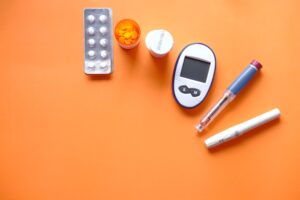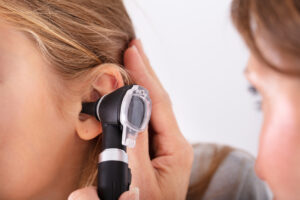October 19, 2021
Diabetes affects 3.4 million Canadians and the number of those affected by diabetes is growing each year. So, what is diabetes? Diabetes is a chronic disease where the body is not able to produce enough insulin or use the insulin it produces properly or both, as such the sugar in the blood (blood glucose) will be higher than normal. Over time, if blood glucose is not well controlled, it can cause damage to several organs of the body, such as the heart, kidneys, eyes, feet, etc.

Diabetes is also known to be the major cause of amputation, blindness, and kidney failure in Canada. But what you may not know, is that diabetes has been associated with hearing loss. In a National Institute of Health (NIH) study in 2008, they found that those with diabetes were more likely to have mild to moderate hearing loss compared to those without diabetes. Although diabetes can result in hearing loss at all frequencies, high-frequency hearing loss is more common. High frequency is where we hear speech and music.
Not much is known about how diabetes affects hearing loss. But based on some studies, it is suspected that high blood glucose over time damages the tiny blood vessels that supply blood and oxygen to the inner ear. Furthermore, high blood glucose levels can also damage the nerves in the ear affecting how the nerve signals moves from the inner ear to the brain, this can lead to hearing loss. Hearing loss is twice as common among people with diabetes than those without diabetes. In a study by Eswaradass and others in 2017, they found that individuals with HbA1c (blood glucose average over 3 months) greater than 7% and longevity of diabetes for more than 8 years, had more severe hearing loss compared to those whose HbA1c was under 7% regardless of age. Interestingly, hearing loss can also happen in people with pre-diabetes. Pre-diabetes is condition where the sugar in the blood (blood glucose) is higher than normal but not high enough to be diagnosed as type 2 diabetes. It was observed that the rate of hearing loss among those with prediabetes was 30% higher than those with normal blood glucose.
For some people with diabetes, hearing loss can also be inherited (Maternally Inherited Diabetes Deafness). Among those living with diabetes, a small percentage, 1% are diagnosed with Maternally Inherited Diabetes Deafness. While the majority, 75% will have damage to the sensitive hair inside the ear that helps convey messages from the inner ear to the brain. Because hearing loss happens slowly, you may not notice it, that’s why early assessment and treatment is key.

Below are some questions you can ask yourself to assess your hearing health:
– Are you always asking others to repeat themselves?
– Are you having problems understanding conversations in a noisy/crowded room?
– Are you having problems following a conversation with more than two people?
– Do you turn the volume of the TV or music on too loud?
– Are you always thinking others are mumbling when they talk?
If your answer is yes to any of the questions above, get your hearing assessed by a professional.

What can you do to prevent hearing loss due to diabetes?
1. Managing your blood glucose and keeping it in target range can help prevent hearing loss.
2. Get your hearing screened once you are diagnosed with diabetes and repeat screening every year.
3. Avoid other causes of hearing loss such as loud noise/sounds, physical trauma to the head or ear, and certain chemicals that can cause hearing loss.
4. If you are on medications that increase the risk of hearing loss, speak to your doctor or pharmacist about other options.
5. If you think you might be experiencing hearing loss, speak to your family doctor to get your hearing assessed.
REFERENCES
15th January 2019 By Editor, & Editor. (2020, January 27). There are a number of other factors which can cause loss of hearing, including illness and physical trauma. some researchers believe the presence of diabetes could contribute to hearing loss or deafness. Diabetes. Retrieved October 13, 2021, from https://www.diabetes.co.uk/diabetes-complications/hearing-loss-and-deafness.html.
Centers for Disease Control and Prevention. (2021, July 22). Diabetes and hearing loss. Centers for Disease Control and Prevention. Retrieved October 13, 2021, from https://www.cdc.gov/diabetes/managing/diabetes-hearing-loss.html.
Venkatesan, E., Nair, H., Anandan, S., & Ismail, M. (2017, August). (PDF) diabetes and hearing loss – researchgate.net. Diabetes and Hearing loss. Retrieved October 13, 2021, from https://www.researchgate.net/publication/333681746_Diabetes_and_Hearing_loss.
